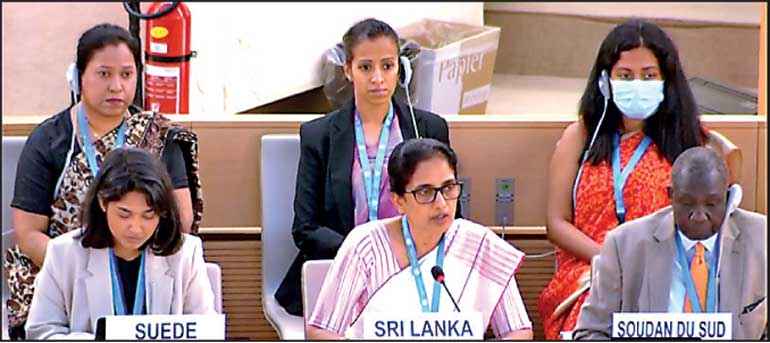Monday Feb 16, 2026
Monday Feb 16, 2026
Tuesday, 12 September 2023 01:17 - - {{hitsCtrl.values.hits}}

Responding to the OHCHR update the Sri Lankan Government yesterday said it has consistently rejected Resolution 46/1 and 51/1 that led to the setting up of the ‘Accountability Project’.
“We also reject the written update, its conclusions and recommendations,” it said.
“We reiterate that it goes beyond the mandate that Member States conferred on the Council by UNGA Resolution 60/251,” the statement read.
“These Resolutions are intrusive and polarising. It is upheld only by a handful of countries for reasons unrelated to human rights, and based on their vote bank domestic politics. Many countries have already raised serious concerns on the budgetary implications of this Resolution given its dubious mandate. Sri Lanka has repeatedly pointed out that this is an unproductive and unhelpful drain on the resources of the Council and its Members. For all the reasons stated above, Sri Lanka will not cooperate with it,” it said.
However, the Government also said Sri Lanka will continue to engage constructively with other mechanisms of the Council that have been productive and beneficial to our people such as the Universal Periodic Review process.
The Government also noted that the economic, social and financial stabilisation that Sri Lanka has achieved in the past year has been appreciated and acknowledged domestically and externally. “Those who are mandated and have the expertise to deal with economic and financial reforms remain confident in the country’s prospects. It is regrettable that the OHCHR has also chosen to ignore the democratic resilience of the country and its institutions demonstrated in the past year,” it said.
“Sri Lanka rejects all Conclusions and Recommendations including references to targeted sanctions as they are based on incorrect and unsubstantiated sources contravening the principles of natural justice and the principles of universality, impartiality, objectivity and non-selectivity. Sri Lanka remains firmly committed to pursuing tangible progress on human rights through our domestic institutions,” it added.